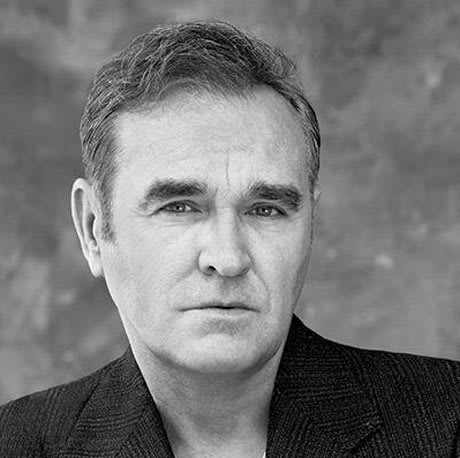By now, just about everybody knows something about Morrissey, whether for his time in the Smiths, his extensive solo career or his ability to spew quotables at will. With such a storied career and a new album, World Peace Is None of Your Business, due July 15, it only makes sense that the Pope of Mope be subject to a Timeline feature in the new Exclaim! Summer Issue.
The feature goes deep on Moz's career, from young Manchester outcast to feverishly beloved musician. Before we publish the full Timeline online, grab a copy of the new print issue to read it, but not before reading five notable facts from the feature below to get you started.
Five Noteworthy Facts You May Not Know About Morrissey:
1. Moz could have been the Clash's singer.
[In 1976,] now an obsessive music fan who regularly writes in to the music weeklies, [Morrissey] is rebuffed by New York Dolls members at their show, but converses briefly with Mick Jones of the opening band, the Clash; Morrissey knows him from having responded to his "singer wanted" ad, but the job had gone to Joe Strummer.
2. The nickname "Moz" started with Johnny Marr in 1984.
The infinitely quotable Morrissey has become the band's mouthpiece in the press; after claiming he's celibate, his sexuality becomes a talking point. His affection for melancholy does, too; Marr plays with the name "misery mozzery," and bequeaths the nickname Moz upon him.
3. The Smiths' most beloved song almost didn't make The Queen Is Dead's tracklist.
Rough Trade preps The Queen Is Dead for release, but lose the argument that "There Is a Light That Never Goes Out" should be the album's single; "Bigmouth Strikes Again" is released instead. "Meekly," Morrissey will later write in his Autobiography, "I had missed the value of 'There Is a Light That Never Goes Out,' and I suggested to Johnny that it shouldn't be included on the album. He laughs a you-silly-thing warranty, and I drop the protest. [...] It is often a relief to be wrong."
4. Morrissey was allegedly encouraged to record an album with Radiohead.
Morrissey moves to Los Angeles at the start of 1998. Mercury is taken over by Seagram and Morrissey spends the year trying to free himself from his contract. It will be five years before he re-signs elsewhere, which Morrissey blames on outrageous demands from major labels, including, according to Simon Goddard's Mozipedia, the request to "sack his band and make an album either with Radiohead or Everything But the Girl singer Tracey Thorn."
5. The Strokes' Julian Casablancas did not call Moz the F-word.
[Morrissey] receives a letter from the Strokes' Julian Casablancas angered by and apologizing for a 2004 NME interview in which he's quoted as calling Morrissey a "faggot," assuring him the quote was fabricated.
Read our full timeline on Morrissey here.
The feature goes deep on Moz's career, from young Manchester outcast to feverishly beloved musician. Before we publish the full Timeline online, grab a copy of the new print issue to read it, but not before reading five notable facts from the feature below to get you started.
Five Noteworthy Facts You May Not Know About Morrissey:
1. Moz could have been the Clash's singer.
[In 1976,] now an obsessive music fan who regularly writes in to the music weeklies, [Morrissey] is rebuffed by New York Dolls members at their show, but converses briefly with Mick Jones of the opening band, the Clash; Morrissey knows him from having responded to his "singer wanted" ad, but the job had gone to Joe Strummer.
2. The nickname "Moz" started with Johnny Marr in 1984.
The infinitely quotable Morrissey has become the band's mouthpiece in the press; after claiming he's celibate, his sexuality becomes a talking point. His affection for melancholy does, too; Marr plays with the name "misery mozzery," and bequeaths the nickname Moz upon him.
3. The Smiths' most beloved song almost didn't make The Queen Is Dead's tracklist.
Rough Trade preps The Queen Is Dead for release, but lose the argument that "There Is a Light That Never Goes Out" should be the album's single; "Bigmouth Strikes Again" is released instead. "Meekly," Morrissey will later write in his Autobiography, "I had missed the value of 'There Is a Light That Never Goes Out,' and I suggested to Johnny that it shouldn't be included on the album. He laughs a you-silly-thing warranty, and I drop the protest. [...] It is often a relief to be wrong."
4. Morrissey was allegedly encouraged to record an album with Radiohead.
Morrissey moves to Los Angeles at the start of 1998. Mercury is taken over by Seagram and Morrissey spends the year trying to free himself from his contract. It will be five years before he re-signs elsewhere, which Morrissey blames on outrageous demands from major labels, including, according to Simon Goddard's Mozipedia, the request to "sack his band and make an album either with Radiohead or Everything But the Girl singer Tracey Thorn."
5. The Strokes' Julian Casablancas did not call Moz the F-word.
[Morrissey] receives a letter from the Strokes' Julian Casablancas angered by and apologizing for a 2004 NME interview in which he's quoted as calling Morrissey a "faggot," assuring him the quote was fabricated.
Read our full timeline on Morrissey here.
